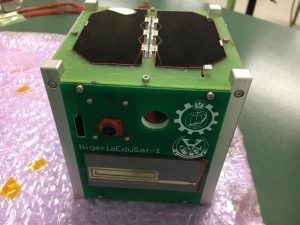NASRDA in collaboration with the Federal University of Technology Akure (FUTA) built and launched a nano-satellite code named NigeriaEdusat-1.The collaboration was in conjunction with the Japanese Birds-1 program which comprises Japan, Ghana, Mongolia, Nigeria and Bangladesh universities which was hosted by Kyushu Institute of Technology, Japan. It was launched from the Kennedy Space Center in Florida, USA into orbit on 3rd of June, 2017.
The five satellite from the Japanese Birds-1 program were launched and docked to the International Space Station from the Japanese Kibō module.
The satellite orbited the Earth at an altitude of 400 kilometers (250 mi) and at an inclination of 51.61 degrees. The satellite traveled around the Earth every 92 minutes at a velocity of 7.67 kilometers per second (17,200 mph).
Operations
The satellite communicated with seven ground stations: one in each of the countries participating in the Birds-1 program, also in Thailand and Taiwan. The primary objective was for the satellite to be a technology demonstrator and to familiarize Nigerian students and scientists with satellite technology and manufacturing techniques. It will also serve as medium for capacity building, domestication satellite technology and other project spin-offs in Nigeria.
Dr. Ibukun Adebolu from FUTA represented Nigeria on the team at Kyushu Institute of Technology while the ground station in Nigeria was solely designed and built in Abuja, NASRDA headquarters by a team of engineers/ scientist led by Dr. Tanko Yakassai (a member of the Nigeriasat-2 KHTT team).

